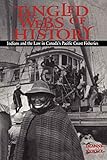Tangled Webs of History : Indians and the Law in Canada's Pacific Coast Fisheries / Dianne Newell.
Material type: TextSeries: HeritagePublisher: Toronto : University of Toronto Press, [1999]Copyright date: ©1993Description: 1 online resource (306 p.)Content type:
TextSeries: HeritagePublisher: Toronto : University of Toronto Press, [1999]Copyright date: ©1993Description: 1 online resource (306 p.)Content type: - 9780802077462
- 9781442680357
- Fishery law and legislation -- British Columbia -- History
- Indians of North America -- Fishing -- Law and legislation -- British Columbia
- Salmon canning industry -- British Columbia -- History
- Salmon fisheries -- Law and legislation -- British Columbia -- History
- Salmon fisheries -- Law and legislation -- British Columbia
- HISTORY / Canada / General
- 347.11037692
- KEB529.5.H8 N48 1993eb
- online - DeGruyter
| Item type | Current library | Call number | URL | Status | Notes | Barcode | |
|---|---|---|---|---|---|---|---|
 eBook
eBook
|
Biblioteca "Angelicum" Pont. Univ. S.Tommaso d'Aquino Nuvola online | online - DeGruyter (Browse shelf(Opens below)) | Online access | Not for loan (Accesso limitato) | Accesso per gli utenti autorizzati / Access for authorized users | (dgr)9781442680357 |
restricted access online access with authorization star
http://purl.org/coar/access_right/c_16ec
Fishing rights are one of the major areas of dispute for aboriginals in Canada today. Dianne Newell explores this controversial issue and looks at the ways government regulatory policy and the law have affected Indian participation in the Pacific Coast fisheries.For centuries, the economies of Pacific Coast Indians were based on their fisheries. Marine resources, mainly salmon, were used for barter, trade, ceremony, and personal consumption. This pattern persisted after the arrival of European and Asian immigrants, even during the first phases of the non-Indian commercial fishing industry when Indian families were depended upon for their labour and expertise. But as the industrial fishery grew, changes in labour supply, markets, and technology rendered Pacific Coast Indians less central to the enterprise and the aboriginal fishery became legally defined as food fishing. By the late 1960s, rigid new licence limitation policies were introduced and regulations transformed the processing sector. The result was reduced participation for fishermen and shoreworkers and the opportunities for Indian men and women declined dramatically. Government programs to increase or even stabilize Indian participation ultimately failed. Newell concludes that the governments of Canada and BC have historically regarded the aboriginal fishery narrowly and unjustly as a privilege, not a right, and have in fact moved against any changes which might put Indians into competition with non-Indians. Recently, BC Indians won a Supreme Court victory in Sparrow (1990) that will make it easier to change federal fisheries policies but aboriginal fishing rights remain before the courts and under federal government investigation.Awarded the Canadian Historical Association's British Columbia and Yukon Certificate of Merit Award for 'Professor Newell's courageous critique of a history of mismanagement and misunderstanding in one of the region's key sectors should provide pause for thought to anyone with an interest in the workings of the modern state.'
Mode of access: Internet via World Wide Web.
In English.
Description based on online resource; title from PDF title page (publisher's Web site, viewed 01. Nov 2023)


